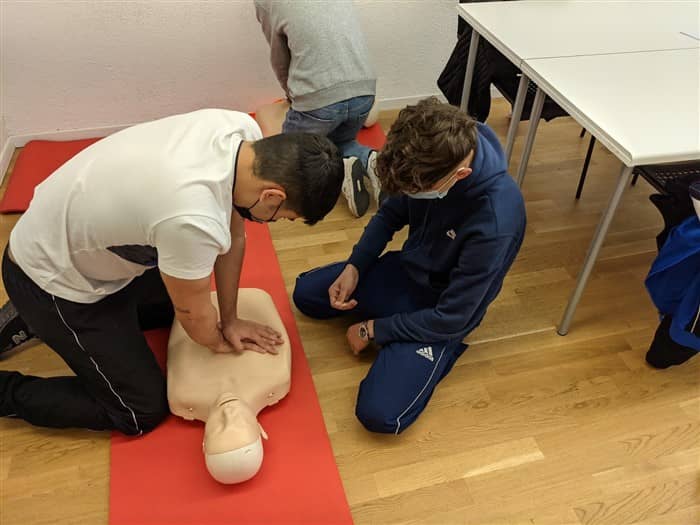CPR, or cardiopulmonary resuscitation, is an important life-saving skill that anyone can learn. But how do you know you’re learning CPR correctly? Earning your CPR certification online is one of the fastest, most convenient, and most accessible ways to learn this skill and further enhance your medical knowledge. Not only that, but by being trained and certified in CPR, you’ll make both your home and workspace a safer environment.
But why do you need CPR certification? As a relatively straightforward medical procedure, it would seem like anyone could pick up this skill on their own. But this isn’t true. By receiving your CPR certification from a professional CPR training program, you’re ensuring that you receive the highest-quality and most up-to-date skills and information. This will allow you to act with confidence and skill if you ever find yourself in an emergency situation. With proper CPR training, you may potentially save a life one day.
Here, we’re taking a closer look at this important medical procedure to understand how it works and how it can be used to help the victim of a cardiac arrest episode. We also delve into CPR certification, what this process looks like, and why it’s critical for you to receive the best and most effective training available.
WHAT IS CPR?
Cardiopulmonary resuscitation (CPR) is a medical procedure designed to help those who have suffered from cardiac arrest. Following a cardiac arrest episode, the heart stops and is unable to pump blood, oxygen, and other nutrients throughout the body. If the brain, for example, goes even just a few minutes without oxygen, permanent damage may occur. This lack of oxygen can even prove fatal.
Essentially, CPR works to mimic the actions of the heart, stabilizing the victim until professional medical attention can arrive. CPR consists of a combination of chest compressions and rescue breaths; however, many experts now note that hands-only CPR (which cuts out the rescue breaths) can be just as effective. Chest compressions help the heart pump blood throughout the body while rescue breaths apply oxygen directly into the lungs of the victim. By repeating this cycle, a bystander can dramatically improve the survival rate of a cardiac arrest victim.
WHAT IS CPR CERTIFICATION?
There are many different types of medical certifications. These are in place, as one might expect, to ensure that doctors and healthcare professionals receive the best training and most current medical information. Learning how to properly perform CPR is no different. When someone’s life may potentially be in your hands, you can’t settle for poor training or a lack of key knowledge. CPR certification is a way to verify that medical professionals (and anyone else who wants to learn this important skill) receives the best information and training.
CPR certification is also an efficient way to prove that you’ve put in the time and effort to learn this medical procedure. Many professions, even those outside of the healthcare field, require or highly suggest CPR certification. Some professions that require CPR training and certification include police officers, firefighters, lifeguards, child care workers, coaches and personal trainers, and even flight attendants. You never know when an emergency will strike, which is why it’s important for as many people to become CPR certified.

DO I REALLY NEED A CPR CERTIFICATION?
For someone unfamiliar with CPR or the medical field at large, it may seem like—at first—you don’t really need a CPR certification. With online videos and books and other materials, there’s certainly enough information available to cover the basics of performing this procedure. However, this approach is not recommended.
Self-taught CPR can only get you so far. Without a professionally designed and instructed course, there’s no way of knowing that you’re receiving the best (or even accurate) information. Just think: would you feel comfortable going into a surgical procedure if your doctor didn’t go to medical school? CPR certification is a small-scale version of this type of training and certification. With CPR certification, you’re receiving the best available information and training that is backed by the top cardiac health organizations (such as the American Heart Association) in the world.
HOW DOES ONLINE CPR CERTIFICATION WORK?
For those looking for CPR certification, there’s no more convenient way than learning online. Online CPR certification classes are fast, convenient, and often even more cost-effective. To begin learning CPR online, all you need is an internet-connected device, such as a laptop, home computer, or even your smartphone.
From there, simply select your course and you can get started immediately. Online CPR classes incorporate video, text, and images to provide the most comprehensive training available. You can start or stop any of the lessons at any time, which makes online CPR certification ideal for those with a full-time job or hectic schedule. Once you’ve passed your final quiz, that’s it—you’re now officially CPR certified. Print off your instant proof of certification and you’re good to go.
CONCLUSION – DO I REALLY NEED A CPR CERTIFICATION?
If you find yourself in an emergency situation, you’ll need the proper skills and knowledge to act effectively. Not only that, however, but you’ll also want the confidence knowing that you’ve received the best training and certification, led by professionals using the latest in educational tools. That’s where CPR training and certification becomes so valuable. When another person’s life is in your hands, you can’t afford to second-guess yourself or hope that what you’ve heard in passing is correct. You want the security and confidence of CPR certification.
With the latest online CPR certification courses, it’s now become easier than ever to earn this certification. You’ll never even have to leave the comfort of your home as you gain important medical knowledge and learn how to both safely and effectively perform CPR. Hundreds of thousands of lives are lost every year to cardiac arrest in the United States. If more bystanders are trained and certified in CPR, this number can be dramatically reduced. Simply enough, lives can be saved. To cultivate a safer community and add a valuable skill to your resume, sign up for your online CPR certification today.



